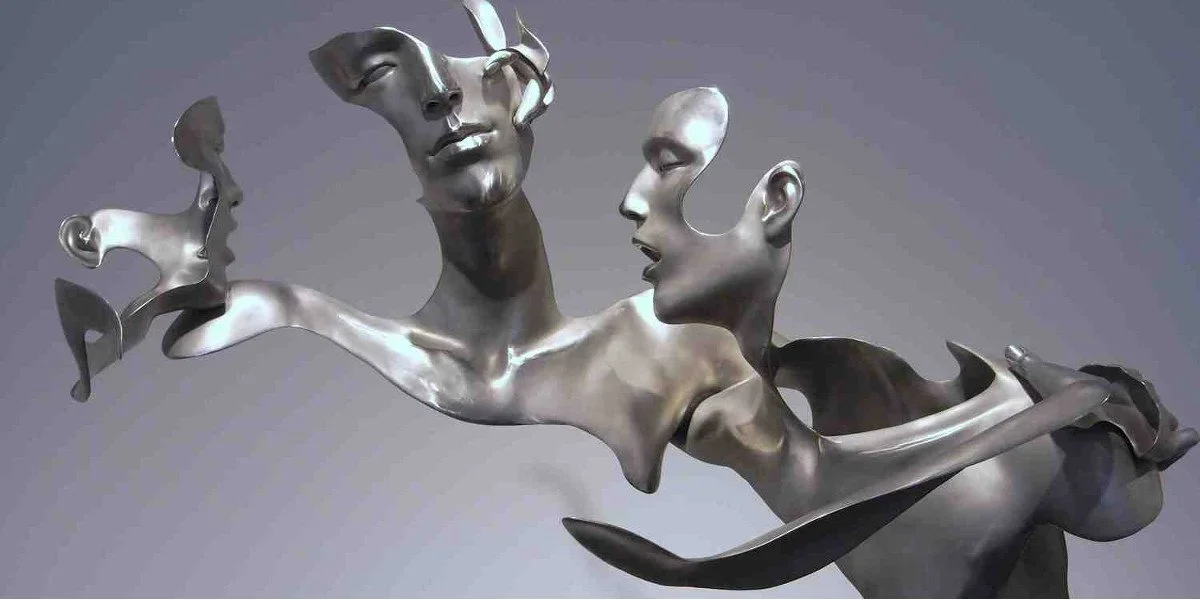Masks
How Cognitive Distortions Create Our Masks, Enable Shapeshifting, and Impact Our Sense of Self and Connection
Photo: Rob Griffin via Unsplash
Ever scrolled through Instagram or TikTok, carefully curating the image you project? Online, it’s easy to shape who we are, highlight our best moments, and filter out the rest. In real life, we do something similar—we wear masks that protect us from judgment, disappointment, or rejection. But how much of what we show, whether online or in person, is truly us?
This constant adaptation, or shapeshifting, is often driven by cognitive distortions—irrational ways of thinking that warp our view of ourselves and the world.Cognitive distortions are like mental shortcuts that steer us in the wrong direction. They make us feel like we need to hide behind masks to avoid discomfort. The more we buy into these thoughts, the more we shape-shift into someone we believe others will accept—whether online with a perfectly filtered post or in real life when we suppress our true emotions to appear “fine.”
Cognitive Distortions: The Filters That Shape Our Online and Offline Masks
Think of cognitive distortions like Instagram filters—except instead of enhancing a picture, they distort reality. These mental filters make us wear masks and shapeshift, changing how we present ourselves to fit what we think others expect.
1. All-or-Nothing Thinking
This distortion pushes you to see things in black-and-white—something is either perfect or a total failure. This mindset leads to the Perfectionist Mask, especially online, where everything has to look flawless. How often have you edited a photo for Instagram to make sure it’s “just right”? This isn’t just about vanity; it stems from a belief that anything less than perfect isn’t good enough.Offline, this distortion might make you hide any vulnerabilities in relationships or work, always trying to appear in control. But wearing the perfectionist mask keeps others from seeing the real, human side of you, making it hard to form authentic connections.
2. Catastrophizing
When you catastrophize, you expect the worst. If your Instagram post doesn’t get enough likes, you might spiral into thinking no one likes you at all. This fear of failure or rejection leads to the Stoic Mask—where you suppress emotions to avoid judgment.In real life, this shows up as always being calm and collected, even when things are falling apart. You don’t let people see your struggles, fearing they’ll judge you as weak. While this mask might protect you from judgment in the short term, it also distances you from real emotional connections.
3. Mind Reading
Mind reading happens when you assume you know what others think, often jumping to negative conclusions. You might believe people are judging you for not having the “perfect” lifestyle. This distortion creates the Chameleon Mask—constantly adapting to fit what you think others want.Online, this might mean curating a social media presence to match what you think people expect—a feed full of aspirational content that doesn’t reflect your real life. Offline, it means changing how you act or speak depending on who you’re with, out of fear of rejection.
4. Personalization
Personalization makes you believe that everything is about you. If a friend doesn’t respond to a message or a colleague cancels lunch, you assume it’s because you did something wrong. This creates the Caregiver Mask, where you overcompensate, always putting others' needs before your own to avoid being seen as uncaring or selfish. On social media, this might mean constantly posting to show you’re likable or engaged, even if it’s draining you. In your personal life, you might sacrifice your own needs, believing your worth comes from how much you do for others.
Shapeshifting: Navigating Online and In-Person Expectations
Cognitive distortions not only create the masks we wear, but they also enable shapeshifting—the constant adaptation to meet others’ expectations. Social media amplifies this tendency. You might post a picture that’s miles away from your actual life because the unfiltered version doesn’t feel “good enough.”
Fear of Rejection
Platforms like Instagram and TikTok can intensify the fear of rejection. Distortions like catastrophizing and mind reading make you believe that unless you present a polished version of yourself, you won’t be accepted. This fear drives shapeshifting—changing how you present yourself, both online and offline, to fit in.In real life, this might mean adjusting to meet others’ expectations, whether at work, with friends, or family. Over time, this leaves you feeling disconnected from your authentic self.
The Pressure for Validation
Cognitive distortions, especially personalization and all-or-nothing thinking, create a constant need for validation. On social media, you might shapeshift into the Performer Mask, posting content that’s sure to get likes, even if it’s not a reflection of who you are. This drive for external validation keeps you chasing approval instead of developing self-worth. In real life, this pressure can lead to burnout, as you prioritize others’ approval over your own well-being.
Avoiding Vulnerability
The fear of being vulnerable often comes from catastrophizing or all-or-nothing thinking. You might wear the Stoic Mask—pretending everything is fine because you believe showing weakness will lead to judgment. Social media thrives on this dynamic—most people only show their best selves, making vulnerability feel risky. In person, this might mean hiding your true feelings from even your closest friends. You act like you’ve got it all together, while inside you feel isolated and disconnected.
Tuva Mathilde Løland via Unsplash
The Impact of Masks and Shapeshifting on Self and Connection
Over time, wearing masks and shapeshifting—whether online or in person—can deeply impact your sense of self and your relationships.
1. Losing Touch with Your Authentic Self
The more you wear masks, the further you drift from your true self. Constantly curating your online presence or adapting to meet others’ expectations makes it hard to know who you really are. You might start to feel lost, unsure of what you value, believe, or want.
2. Superficial Connections
Masks and shapeshifting lead to surface-level relationships. When people only see the version of you that’s performing or perfecting, they can’t truly know you. Whether online or offline, this leads to relationships that feel shallow, built on appearances rather than authenticity.
3. Eroded Self-Worth
Relying on cognitive distortions and external validation erodes self-worth. If your self-esteem is tied to likes, comments, or others' approval, any dip in that feedback leaves you feeling anxious, insecure, or inadequate.
How Therapy Can Help You Unmask and Reconnect
Therapy offers tools to challenge cognitive distortions and break free from mask-wearing and shapeshifting. Cognitive Behavioral Therapy (CBT) can help you question distorted thoughts, like needing to be perfect or assuming others are judging you. Mindfulness practices teach you to stay present and recognize when you're slipping into old habits, allowing you to choose authenticity. Creative exercises like mask-making can help you visualize the masks you wear, while role-playing in therapy lets you practice showing up as your true self, both online and offline.
Conclusion: Breaking Free from the Masks
Cognitive distortions push us to wear masks, whether we’re presenting ourselves online or interacting in real life. These masks may help us feel safe or accepted in the short term, but they also distance us from our true selves. Therapy helps you peel back the layers, break free from these distortions, and reconnect with your authentic self. By challenging these patterns and embracing vulnerability, you can build deeper connections and rediscover self-worth that isn’t tied to external validation.
Unmask Group. Liu Zhan, Kuang Jun and Tan Tianwei. China 2001.




